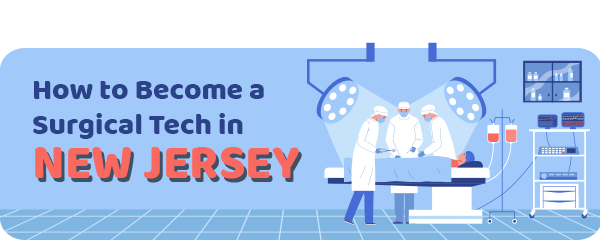In New Jersey, surgical teams are always prepared to act swiftly, particularly in emergencies.
These teams consist of various professionals, including surgeons, anesthesia specialists, surgical nurses, and surgical technicians.
They collaborate seamlessly, starting before the surgery commences and continuing their coordination until the surgery concludes.
These professionals are often referred to as operating room (OR) techs or scrub techs.
Article Table of Contents
Job Description and Responsibilities of Surgical Technologists
Surgical technologists in New Jersey are responsible for a range of duties during their shifts.
Their tasks encompass:
- Preparing patients for surgery
- Transporting patients to and from the OR
- Preparing the OR with surgical equipment and supplies
- Monitoring the instrument count throughout surgery
- Handing the surgeon medical instruments
- Closing wounds and bandaging patients
It’s essential to note that this list does not encompass all the responsibilities of these dedicated medical professionals.
Training and Education for Surgical Technologists in New Jersey
Surgical technologists in New Jersey are primarily under the jurisdiction of their employing institutions.
However, embarking on the path to becoming a surgical technologist is a comprehensive process.
It commences with a high school diploma or the attainment of a General Educational Development (GED) certificate.
Subsequently, individuals should enroll in a specialized training program tailored to this occupation.
This process necessitates both formal education and clinical training.
Several educational institutions offer these training programs across New Jersey, each with its unique admission prerequisites.
Commonly, prospective students can expect to study subjects such as:
- Microbiology,
- Pathophysiology,
- Pharmacology,
- Anatomy,
- Physiology,
- Medical terminology
Additionally, proficiency in cardiopulmonary resuscitation (CPR) and other relevant certifications is often a requirement.
Bevill State Community College 
The school offers courses covering topics like:
- Sterile processing,
- Infection control
- Sterilization,
- Instrumentation identification,
- Safety
Admission criteria may include possessing a high school diploma or GED and passing placement exams like the Accuplacer.
In some cases, demonstrating relevant medical-related experience and carrying health insurance are also considered.
Calhoun Community College 
This program encompasses two years of classroom, lab, and clinical instruction.
To earn an Associate in Applied Science (AAS) degree here, students must complete additional general education credit hours and meet various program-specific requirements.
Before all this to be possible, candidates must pass the admission process that requires them to:
- Apply online
- Attend a program information session
- Complete a Manual Dexterity Exam
Bergen Community College 
Candidates to this college must pass a criminal background check as well as a drug screening test.
The program offered here entails a blend of classroom-based learning and hands-on clinical experience.
The clinical experience takes place in a “mock” operating room and in a sterilization/prep room, both made to reflect real such rooms with real scenarios taking place there.
Like this, students complete 120 or more surgical cases before graduation.
Berkeley College 
Berkeley College offers a comprehensive associate degree program in surgical technology, typically spanning two years.
Graduates of this program consistently achieve certification at a rate exceeding the industry average.
The curriculum includes a critical operating room clinical practicum, equipping students with the skills and knowledge required for national certification.
Sussex County Community College 
Sussex County Community College presents an intensive two-semester surgical technology program designed to prepare students for the field and certification within one year.
Admission to this competitive program is selective, ensuring a dedicated cohort of students.
Classroom instruction is complemented by clinical rotations at various nearby medical centers and hospitals, providing a holistic learning experience.
| School Name | Address |
|---|---|
| Bergen Community College | 400 Paramus Rd, Paramus, NJ 07652 |
| Bevill State Community College | online |
| Sussex County Community College | 1 College Hill Rd, Newton, NJ 07860 |
| Calhoun Community College | online |
| Berkeley College | 44 Rifle Camp Rd, Woodland Park, NJ 07424 |
Certification for Surgical Technologists in New Jersey
While surgical technologist certification is not mandated by law, many employers in New Jersey seek certified professionals for these roles.
Certification can be obtained through various bodies, such as:
- National Surgical Assistant Association (NSAA)
- Provides the Certified Surgical Assistant (CSA) qualification
- National Board of Surgical Technology and Surgical Assisting (NBSTSA)
- Provides the Certified Surgical Technologist/Certified First Assistant credential
- National Center for Competency Training (NCCT)
- Provides the Tech in Surgery Certification
Among these, the NBSTSA certification is highly regarded nationally.
The certification exam, administered at testing centers across New Jersey, comprises 200 questions, with a minimum of 119 correct answers required to pass.
To obtain and maintain certification, candidates are required to pay associated fees and renew every four years.
This requires either retaking the certification exam or completing continuing education coursework, accumulating 60 education credits during the renewal period.
Renewing certification also involves a renewal fee and retaking the exam means you pay for it once again.
Surgical Technologist Salaries in New Jersey
Surgical technologists in New Jersey may not hold the most glamorous position, but the potential income in this profession is noteworthy.
In the state of New Jersey, operating room technicians can earn an annual salary of about $56,600.
The following table offers insights into the cities in New Jersey where these professionals can earn higher salaries relative to the rest of the state.
Annual Salary Range:| Location | Avg. Annual Salary |
|---|---|
| Hoboken | $60,400 |
| West New York | $60,400 |
| Bloomfield | $59,300 |
| Passaic | $59,300 |
| Bergenfield | $59,300 |
| Fort Lee | $59,300 |
| Leonia | $59,300 |
| Bayonne | $58,200 |
| Irvington | $58,200 |
| Middlesex | $57,700 |
Regional Salary in New Jersey
| Region | Employed | Avg. Annual Salary | Avg. Hourly Pay | Top 10% Annual Salary | Bottom 10% Annual Salary |
|---|---|---|---|---|---|
| Atlantic City-Hammonton, NJ | 60 | $66,560 | $32 | $77,740 | $51,790 |
| Ocean City, NJ | ** | $70,330 | $33.81 | $77,780 | $61,020 |
| Trenton, NJ | 110 | $67,870 | $32.63 | $79,260 | $49,960 |
| Vineland-Bridgeton, NJ | 40 | $63,280 | $30.42 | $69,650 | $48,960 |
* Employment conditions in your area may vary.
Frequently Asked Questions
Can a Surgical Tech From New Jersey Choose a Specialty?
YES!
Just like surgeons can choose to operate on a specific body part, so can these techs.
Here are the most commonly chosen surgery niches:
- General surgery,
- Ob/gyn,
- Urology,
- Plastics,
- Neurology
Where Do Surgical Technologists from New Jersey Find Work?
These technologists usually work in a hospital’s surgery wing.
Furthermore, these other places also hire such specialists:
- Children’s hospitals
- Cosmetic surgery centers
- Specialty clinics for surgical procedures
What Skills Do I Need To Work As A Surgical Tech in New Jersey?
Here are the most important skills this profession requires:
- Able to work as part of a team
- Detail-oriented
- Take direction
- Understanding medical terms
- Understanding medical methodology
- Good communication skills
Read the full guide: How to Become a Surgical Technologist




